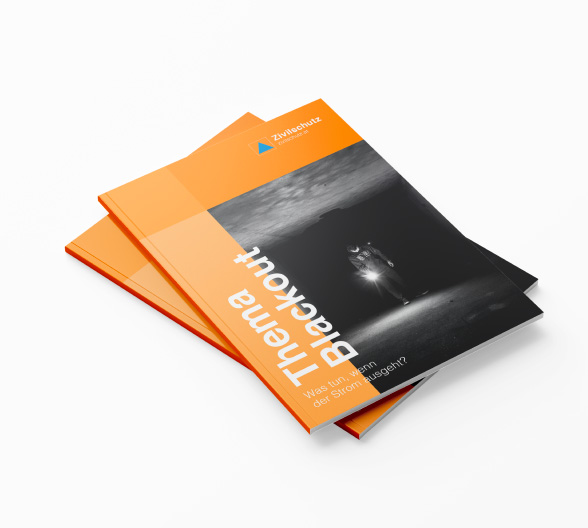Any crisis scenario can be more easily managed if your household is prepared accordingly. In the event of a blackout, radioactive fallout or even an avalanche, the basic requirements for your crisis preparedness are always the same:
- Think about which scenarios could affect you
- Stock up accordingly
- Discuss your plans with your household and those around you
- Check your household regularly
We recommend that you plan for at least 10-14 days.
Emergency plan
In emergency scenarios, it is a basic need to know whether your loved ones are unharmed and to get them to safety. Ideally, everyone should have a means of communication available at all times and that still works in an emergency – but this cannot be guaranteed. That’s why a family emergency plan is important.
Your emergency plan includes
- Courses of action for all those affected in various scenarios (if-then principle)
- Emergency assembly point in the event of damage or fire at home
- The responsibilities of all household members in an emergency
Emergency bag
There are many disasters that may make evacuation necessary. Depending on the situation, it may be some time before you are allowed back into your home. An emergency pack should help you to cope with the first few days away from home. A rucksack is more practical than a suitcase, as it leaves you with both hands free.
- Warm clothing, sturdy shoes & rain protection
- Hygiene articles
- Pocket knife
- Cash & ID cards
- Required medication
- Matches or lighter, torch
- Emergency provisions
- Document folder
- Passport or identity card
- Birth certificate
- Proof of citizenship
- Marriage certificate or divorce certificate
- Registration form
- Savings books
- Certificates
- Insurance policies
- Certificates and other important documents
- Photo documentation of valuable objects
Communication
To stay informed, you need channels you can rely on. ORF stations also broadcast in crisis situations, and keep you informed on current developments. To receive information, you need at least one emergency radio that can also be used independently of the power supply (with batteries or a crank drive).
Food
The most important symbol of a crisis-proof household is certainly a well-organised, good stock of food. It can be used not only in crisis situations, but also to bridge a gap in everyday life when the fridge may be empty.
Pay attention to the following points when stocking up on food:
- Stock up for at least 10-14 days
- Make sure your food is as balanced and varied as possible
- Make sure it has a shelf life as long as possible
- Take account of intolerances and eating habits in your household.
- Only buy provisions that you like and that you can prepare!
We use the Austrian food pyramid to suggest the ideal food supply for you:
We advise you to store at least 2 litres of water per person per day. You can supplement normal water with fruit and vegetable juices.
We advise you to store at least 2 litres of water per person per day.
- 28 litres of water
- 2 litres of fruit juice
You should eat 5 portions of vegetables, pulses or fruit a day for a balanced diet. A quantity of vegetables the size of your clenched fist is equivalent to one portion.
You will find these products in jars, tins or dried in any supermarket.
Example for 2 weeks per person:
- 2 jars of salad vegetables
- 15 tins á 500g
We recommend 4-5 portions of carbohydrates per day. You can cover this requirement with different foods: bread, pastries, muesli, pasta, rice & cereals or potatoes.
Example for 2 weeks per person:
- 1 kg flour
- 1 kg rice
- ½ kg pasta
- 1 kg bread or crispbread
- 2 kg potatoes
Milk and dairy products are part of a balanced diet, and you should consume 3 portions per day. Storing milk and dairy products outside the fridge is difficult. You can store long-life milk (UHT milk) or long-life cheese wedges (processed cheese) for up to several months. Please note that long-life milk must also be consumed as soon as possible after opening. Alternatively, you can also use powdered milk. Hard cheese can also be stored for a longer period of time, depending on how it is stored.
Milk substitutes (e.g. made from soya, almonds, oats etc.) sometimes have a longer shelf life, but are not a complete substitute for milk in terms of their physiological and nutritional value.
Example for 2 weeks per person:
- 1 litre long-life milk (preferably in smaller packs)
- Dried milk/milk powder
- 1 pack of processed cheese (cheese wedges)
You should not forget to stock up on fats and oils not only for cooking, but also for your diet (in moderation). Vegetable oils have a long shelf life and can therefore be stored well in your pantry.
Example for 2 weeks per person:
- 250g spreadable fat
- ½ litre of vegetable oil
You should consume at least 1-2 portions of fish, a maximum of 3 portions of meat and up to three eggs per week.
You can add fish to your household supplies in pickled, dried, smoked or tinned form. Ready-made meals are also available. You can use similar products for meat, although a large amount of salt is often used to preserve them. Make sure your diet contains as little salt as possible!
Eggs can be kept for up to two weeks in cooked form without refrigeration. Remember that you can boil and preserve fresh eggs in an emergency.
Example for 2 weeks per person:
- 2 tins of conserved fish
- 2 tins of spreads
- 10 eggs
You should only consume small quantities of fatty, sweet and savoury foods.
However, especially in crisis situations, you can also plan foods for your household that can give you pleasure from time to time or be a special treat in difficult times.
Example for 2 weeks per person:
- 1 jar of jam or honey
- Coffee, tea or cocoa as required
- Snacks as required
- Chocolate & sweets as required
When stocking up, also consider any infant or baby food you may need. In most cases, this has a long shelf life and can be stored well.
Also take the needs of your pets into account when making your plans! Plan pet food for 10 to 14 days, and don’t forget water. In the event that you are unable to leave the house, you must also consider the collection, storage and disposal of faeces.
Light, heating & cooking
In the event of a crisis, the electricity or fuel supply may be interrupted. Lighting, cooking or heating may be more difficult or even impossible as a result.
Light
For the event of a normal power cut or a longer-term scenario, you should have alternative light sources available at home.
- Light sources (LED lights, safety candles, etc.)
- Torch
- Batteries
Cooking
In the event of a power or gas failure, there are several alternatives for preparing food:
- Classic wood-burning stoves
- Camping stoves
- Gas hobs
- Fuel paste cookers
- Barbecues
Don’t forget to stock up on sufficient fuel!
Heating
As an alternative to heating with electricity or gas, you can use heaters that run on paraffin or bottled gas, tiled ovens, wood-burning stoves and similar appliances. You can also use an “emergency fireplace”. Please note that all these methods require a watchful eye and sufficient fresh air!
Home pharmacy
You should consider the following when stocking your medicine cabinet:
From plasters to wound dressings and safety pins, you should be equipped to deal with minor accidents in your household.
From wound care products to diarrhoea medication and tablets for a sore throat, a certain basic stock of medicines belongs in every medicine cabinet.
Make sure you stock up on long-term medication for up to two weeks!
Also stock up on disinfectant, rubber gloves and FFP2 masks.
A clinical thermometer, scissors and other aids should not be missing either.
Please also note the correct storage of medicines and the expiry dates!
Hygiene articles
In the event of disasters or prolonged emergencies, it is possible that water may no longer be available – and this is when hygiene is crucial.
Toothbrushes, toothpaste, soap, shampoo, toilet paper, sanitary towels or tampons, washing powder and cleaning products are among the essential hygiene items.
Waste & waste water
In the event that it is not possible to take waste outside the home, make sure you have enough rubbish bags for 10-14 days.
An interruption to the mains water supply will also disable the toilet flushing system. An emergency toilet must therefore also be considered. The simplest way to dispose of human waste is to use emergency toilet bags. These are easily attached under the toilet seat.
If no other alternative is available, a bucket with a lid and a sturdy plastic bag can also be used as an emergency toilet at short notice.


